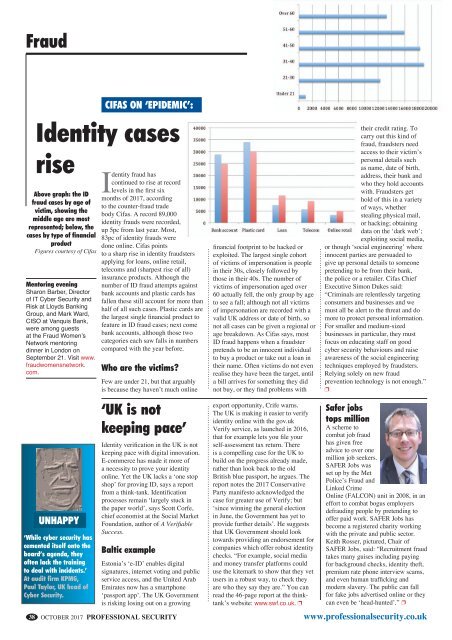27-10final
You also want an ePaper? Increase the reach of your titles
YUMPU automatically turns print PDFs into web optimized ePapers that Google loves.
Fraud<br />
Above graph: the ID<br />
fraud cases by age of<br />
victim, showing the<br />
middle age are most<br />
represented; below, the<br />
cases by type of financial<br />
product<br />
Figures courtesy of Cifas<br />
38<br />
cifas on ‘epidemic’:<br />
Identity Identity cases<br />
cases rise<br />
rise<br />
Mentoring evening<br />
Sharon Barber, Director<br />
of IT Cyber Security and<br />
Risk at Lloyds Banking<br />
Group, and Mark Ward,<br />
CISO at Vanquis Bank,<br />
were among guests<br />
at the Fraud Women’s<br />
Network mentoring<br />
dinner in London on<br />
September 21. Visit www.<br />
fraudwomensnetwork.<br />
com.<br />
UNHAPPY<br />
‘While cyber security has<br />
cemented itself onto the<br />
board’s agenda, they<br />
often lack the training<br />
to deal with incidents.’<br />
At audit firm KPMG,<br />
Paul Taylor, UK head of<br />
Cyber Security.<br />
Identity fraud has<br />
continued to rise at record<br />
levels in the first six<br />
months of 2017, according<br />
to the counter-fraud trade<br />
body Cifas. A record 89,000<br />
identity frauds were recorded,<br />
up 5pc from last year. Most,<br />
83pc of identity frauds were<br />
done online. Cifas points<br />
to a sharp rise in identity fraudsters<br />
applying for loans, online retail,<br />
telecoms and (sharpest rise of all)<br />
insurance products. Although the<br />
number of ID fraud attempts against<br />
bank accounts and plastic cards has<br />
fallen these still account for more than<br />
half of all such cases. Plastic cards are<br />
the largest single financial product to<br />
feature in ID fraud cases; next come<br />
bank accounts, although those two<br />
categories each saw falls in numbers<br />
compared with the year before.<br />
Who are the victims?<br />
Few are under 21, but that arguably<br />
is because they haven’t much online<br />
‘UK is not<br />
keeping pace’<br />
Identity verification in the UK is not<br />
keeping pace with digital innovation.<br />
E-commerce has made it more of<br />
a necessity to prove your identity<br />
online. Yet the UK lacks a ‘one stop<br />
shop’ for proving ID, says a report<br />
from a think-tank. Identification<br />
processes remain ‘largely stuck in<br />
the paper world’, says Scott Corfe,<br />
chief economist at the Social Market<br />
Foundation, author of A Verifiable<br />
Success.<br />
Baltic example<br />
Estonia’s ‘e-ID’ enables digital<br />
signatures, internet voting and public<br />
service access, and the United Arab<br />
Emirates now has a smartphone<br />
‘passport app’. The UK Government<br />
is risking losing out on a growing<br />
OCTOBER 2017 PROFESSIONAL SECURITY<br />
financial footprint to be hacked or<br />
exploited. The largest single cohort<br />
of victims of impersonation is people<br />
in their 30s, closely followed by<br />
those in their 40s. The number of<br />
victims of impersonation aged over<br />
60 actually fell, the only group by age<br />
to see a fall; although not all victims<br />
of impersonation are recorded with a<br />
valid UK address or date of birth, so<br />
not all cases can be given a regional or<br />
age breakdown. As Cifas says, most<br />
ID fraud happens when a fraudster<br />
pretends to be an innocent individual<br />
to buy a product or take out a loan in<br />
their name. Often victims do not even<br />
realise they have been the target, until<br />
a bill arrives for something they did<br />
not buy, or they find problems with<br />
export opportunity, Crife warns.<br />
The UK is making it easier to verify<br />
identity online with the gov.uk<br />
Verify service, as launched in 2016,<br />
that for example lets you file your<br />
self-assessment tax return. There<br />
is a compelling case for the UK to<br />
build on the progress already made,<br />
rather than look back to the old<br />
British blue passport, he argues. The<br />
report notes the 2017 Conservative<br />
Party manifesto acknowledged the<br />
case for greater use of Verify; but<br />
‘since winning the general election<br />
in June, the Government has yet to<br />
provide further details’. He suggests<br />
that UK Government should look<br />
towards providing an endorsement for<br />
companies which offer robust identity<br />
checks. “For example, social media<br />
and money transfer platforms could<br />
use the kitemark to show that they vet<br />
users in a robust way, to check they<br />
are who they say they are.” You can<br />
read the 46-page report at the thinktank’s<br />
website: www.swf.co.uk. p<br />
their credit rating. To<br />
carry out this kind of<br />
fraud, fraudsters need<br />
access to their victim’s<br />
personal details such<br />
as name, date of birth,<br />
address, their bank and<br />
who they hold accounts<br />
with. Fraudsters get<br />
hold of this in a variety<br />
of ways, whether<br />
stealing physical mail,<br />
or hacking; obtaining<br />
data on the ‘dark web’;<br />
exploiting social media,<br />
or though ‘social engineering’ where<br />
innocent parties are persuaded to<br />
give up personal details to someone<br />
pretending to be from their bank,<br />
the police or a retailer. Cifas Chief<br />
Executive Simon Dukes said:<br />
“Criminals are relentlessly targeting<br />
consumers and businesses and we<br />
must all be alert to the threat and do<br />
more to protect personal information.<br />
For smaller and medium-sized<br />
businesses in particular, they must<br />
focus on educating staff on good<br />
cyber security behaviours and raise<br />
awareness of the social engineering<br />
techniques employed by fraudsters.<br />
Relying solely on new fraud<br />
prevention technology is not enough.”<br />
p<br />
Safer jobs<br />
tops million<br />
A scheme to<br />
combat job fraud<br />
has given free<br />
advice to over one<br />
million job seekers.<br />
SAFER Jobs was<br />
set up by the Met<br />
Police’s Fraud and<br />
Linked Crime<br />
Online (FALCON) unit in 2008, in an<br />
effort to combat bogus employers<br />
defrauding people by pretending to<br />
offer paid work. SAFER Jobs has<br />
become a registered charity working<br />
with the private and public sector.<br />
Keith Rosser, pictured, Chair of<br />
SAFER Jobs, said: “Recruitment fraud<br />
takes many guises including paying<br />
for background checks, identity theft,<br />
premium rate phone interview scams,<br />
and even human trafficking and<br />
modern slavery. The public can fall<br />
for fake jobs advertised online or they<br />
can even be ‘head-hunted’.” p<br />
www.professionalsecurity.co.uk










